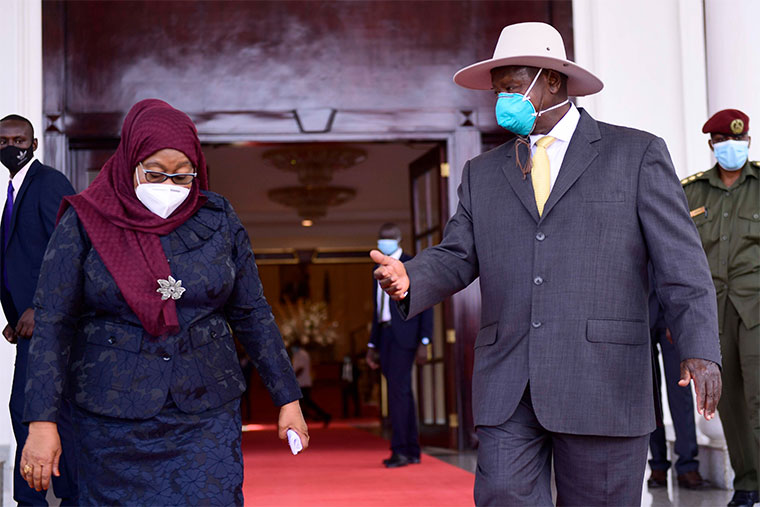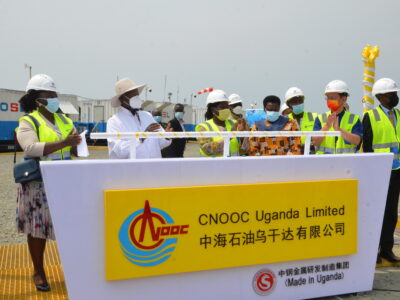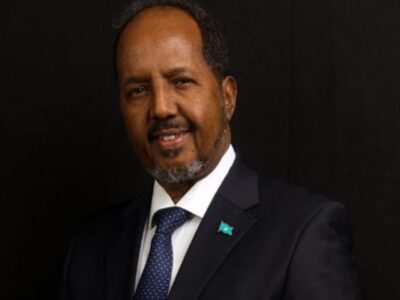Uganda and Tanzania have finally signed the East African Crude Oil Pipeline (EACOP) agreement which signals the four-year start of the construction of the pipeline that will transport Uganda’s oil from Hoima to the coastal port of Tanga.
Today Sunday, President Yoweri Museveni and Samia Suluhu Hassan, and officials from the oil companies; CNOOC and Total signed the Host Government Agreement, Shareholding agreement and the Tariff and Transportation agreement.
Speaking after the signing of the $3.5 billion agreement, Museveni, said that although he did not initially support the idea of a pipeline because he wasn’t for the export of crude oil and talks were advanced with Kenya, he chose to work with Tanzania because of its historical contribution towards Uganda liberation twice – in 1978-79 when the Tanzanian forces ousted Idi Amin, and 1985/6 when again Tanzania offered 5,000 rifles which Museveni and his NRA rebels used to capture Kampala.
With this support, Museveni said Tanzania helped Uganda to sort out the political mess that had been created by past leaders. Museveni thanked Suluhu for accepting to sign the agreement today April 11, 2021, saying both countries hold an emotional attachment to April 11 because it is the same day 42 days ago in 1979 when the Tanzanian army launched the assault on Kampala and deposed Amin.
“Uganda discovered oil and gas in 2006, it has taken these 15 years before the first oil on account of the divergent perceptions between us and the oil companies. Initially, I did not favour the idea of a pipeline, my question was why export the oil? Don’t the East Africans need the oil?” said Museveni.
“In this thinking, I preferred an oil refinery only so that we use the extractable oil out of the 6.5 billion barrels confirmed in only 20% of the total potential area in the Mutanzinge and surrounding areas known as the Albertine region by foreigners to satisfy the demand for the refined products for Uganda, northwest Tanzania, western Kenya, Rwanda, Burundi, eastern Congo, South Sudan and southwestern Ethiopia with cheaper products on the account of the lower transport costs.”

Museveni said with the demand in the region now standing at 98,000 barrels of oil per day, the vendors demand is currently 39,000 barrels per day at a price of $50 per barrel equivalent to about $63 barrel of refined products, the locally processed petroleum would have saved Uganda at least $1.6 billion on import expenditure on oil products imports and would have made the East African region self-reliant for some 38 years. However, Museveni said, the oil companies were biased towards exporting crude oil only and therefore there had to be a compromise to have both the refinery and the pipeline.
Museveni added that the pipeline can further be utilised by other regional countries with oil including Congo and South Sudan and Mozambique with a return pipeline to supply gas to Uganda.
“This is a modest contribution to the development of Tanzania but can’t compensate for the removal of Idi Amin and liberation of Mozambique,” said Museveni.
On her part, President Suluhu thanked Museveni for postponing the signing of the agreement from March 22, 2021, to allow Tanzania to mourn the sudden death of her predecessor President John Pombe Magufuli.
“The signing of this agreement on this auspicious occasion is not just for Uganda and Tanzania but the entire East Africa region. As you are all aware, this project will have an impact on social-economic development and geostrategic dynamics. Among other benefits, the project will yield revenues to both countries while creating both short and long term employment for both skilled professionals and semi-skilled professionals as well as casual labourers thus addressing the unemployment challenges of both countries, especially among the youth,” Suluhu said.
“It is expected that more than 10,000 employment opportunities are expected to be created during execution and upon its completion. Apart from social-economic benefits, the project will also stimulate trade, investment as well as unlocking the East Africa’s oil potential thus attracting more investors. But importantly, this project will strengthen strategic partnerships and cooperation between our two governed countries and will further forge people’s interactions…” Suluhu added.
She however urged the East African countries to embark on extensive infrastructural development strategy through the construction of ports, airports, roads if they are harness and benefit from the mineral resources that they possess.
The chairman and chief executive officer of French oil giant Total, Patrick Pouyanne, thanked Museveni for his unwavering commitment to the oil project. He said signing the agreement is a historical milestone in the journey of the oil industry not only for Uganda and Tanzania and for the whole of the East African region.
“It’s a very large project – one of the largest to be developed on this content. It’s more than $10 billion. It wouldn’t be possible without your commitment. This is the beginning of the journey that will take four years for the oil to start flowing from Uganda to Tanzania,” Pouyanne said.
The construction of the pipeline is expected to take four years for the oil to start flowing. If complete, it will be the longest heated crude oil pipeline line in the world.
************
The Observer












